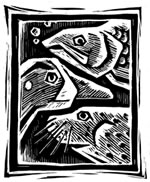- Home
- Restoration Projects
- Project Search
- LTM Program: The Seward Line - Marine Ecosystem monitoring in the Northern Gulf of Alaska 21120114-L
Project Information
Title: LTM Program: The Seward Line - Marine Ecosystem monitoring in the Northern Gulf of Alaska 21120114-L
Project Year and Number: 2021: 21120114-L
Other Fiscal Years and Numbers for this Project: 2023: 23120114-L , 2022: 22120114-L , 2020: 20120114-L, 2019: 19120114-L, 2018: 18120114-L, 2017: 17120114-L, 2016: 16120114-J, 2015: 15120114-J, 2014: 14120114-J, 2013: 13120114-J, 2012: 12120114-J
Principal Investigator (PI): Russ Hopcroft (University of Alaska Fairbanks), Seth Danielson (University of Alaska Fairbanks)
Managing Agency: NOAA
Assisting Personnel: None
Project Website: https://gulfwatchalaska.org/monitoring/environmental-drivers/the-seward-line-marine-ecosystem-monitoring-in-the-northern-gulf-of-alaska/
Research Location: Gulf of Alaska, Resurrection Bay
Restoration Category: Monitoring
Injured Resources Addressed: Not Specified
Abstract:We are continuing multi-disciplinary oceanographic observations begun in fall 1997 in the northern Gulf of Alaska. Cruises occur in early May and early September to capture the typical spring bloom and summer conditions, respectively, along a 150-mile cross shelf transect to the south of Seward, Alaska. The line is augmented by stations in the entrances and deep passages of Prince William Sound. We determine the physical-chemical structure, the distribution and abundance of phytoplankton, microzooplankton, and mesozooplankton, and survey seabirds and marine mammals. These observations enable descriptions of the seasonal and inter-annual variations of this ecosystem. Our goal is to characterize and understand how different climatic conditions influence the biological conditions across these domains within each year, and what may be anticipated under future climate scenarios. Beginning in 2018, funding as one of the National Science Foundation’s Long-term Ecological Research (LTER) sites allowed expanded sampling on the shelf upstream of Prince William Sound, including near Middleton Island, to help better understand spatial variability on the shelf. Last year (2019) saw near record summer temperatures on the shelf that persisted through fall offshore, a harsh winter drew most of this heat out of the system, returning May 2020 to the climatological mean. Warm-water associated zooplankton with smaller body size and lower lipid content rebounded during fall 2019.
Some LTER components have been impacted by COVID-19. March and April GAK1 monthly trips did not occur but the May 2020 survey was executed using a skeleton science team of 3 and the summer survey with half the normal science compliment. The September cruise will continue as planned. We are not proposing or anticipating any major changes to this project for FY21.
Proposal: View (508 KB)
Reports:
FY17-21 Final Report: View (3,384 KB)
Publications from this Project: None Available
